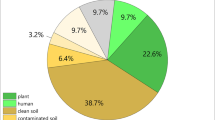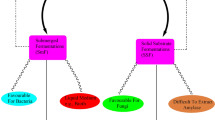Abstract
A dipicolonic acid fluorimetry assay was used instead of plate counting for the assessment of spore yields for enhanced optimization efficiency. The associated parameters, including the ratio of solid substrates, composition of liquid substrates, and cultivation conditions, were systematically optimized in a shake-flask culture. The maximum spore yield of 7.24 × 1010 CFU/g of wet substrate was achieved. The optimization process produced a 25.7-fold increase in spore yields compared with those before optimization. In addition, the maximum release of bioactive metabolites during spore accumulation was subsequently obtained with 573.0 U/g of protease, 188.8 U/g of amylase, 186.8 U/g of cellulase, and 3.45 mg/g of acid-soluble protein. The experiment provides a methodological basis for the rapidly optimized production of Bacillus spores in pure solid-state fermentation.




Similar content being viewed by others
References
Guo XH, Li DF, Lu WQ, Piao XS, Chen XL (2006) Screening of Bacillus strains as potential probiotics and subsequent confirmation of the in vivo effectiveness of Bacillus subtilis MA139 in pigs. Antonie Van Leeuwenhoek 90:139–146
Gupta A, Gupta P, Dhawan A (2014) Dietary supplementation of probiotics affects growth, immune response and disease resistance of Cyprinus carpio fry. Fish Shellfish Immun 41:113–119
Mingmongkolchai S, Panbangred W (2018) Bacillus probiotics: an alternative to antibiotics for livestock production. J Appl Microbiol 124:1334–1346
Ramesh D, Souissi S, Ahamed TS (2017) Effects of the potential probiotics Bacillus aerophilus KADR3 in inducing immunity and disease resistance in Labeo rohita. Fish Shellfish Immun 70:408–415
Zhang W, Zhu YH, Zhou D, Wu Q, Song D, Dicksved J, Wang JF (2017) Oral administration of a select mixture of Bacillus probiotics affects the gut microbiota and goblet cell function following Escherichia coli challenge in newly weaned pigs of genotype muc4 that are supposed to be enterotoxigenic E. coli F4ab/ac receptor negative. Appl Environ Microbiol 83:e02747–e02716
Cutting SM (2011) Bacillus probiotics. Food Microbiol 28:214–220
Elshaghabee FMF, Rokana N, Gulhane RD, Sharma C, Panwar H (2017) Bacillus as potential probiotics: status, concerns, and future perspectives. Front Microbiol 8:1490
Berikashvili V, Sokhadze K, Kachlishvili E, Elisashvili V, Chikindas ML (2017) Bacillus amyloliquefaciens spore production under solid-state fermentation of lignocellulosic residues. Probiotics Antimicro. https://doi.org/10.1007/s12602-017-9371-x
Khardziani T, Kachlishvili E, Sokhadze K, Elisashvili V, Weeks R, Chikindas ML, Chistyakov V (2017) Elucidation of Bacillus subtilis KATMIRA 1933 potential for spore production in submerged fermentation of plant raw materials. Probiotics Antimicro 9:435–443
Pryor SW, Gibson DM, Hay AG, Gossett JM, Walker LP (2007) Optimization of spore and antifungal lipopeptide production during the solid-state fermentation of Bacillus subtilis. Appl Biochem Biotechnol 143:63–79
Zhao S, Hu N, Huang J, Liang Y, Zhao B (2008) High-yield spore production from Bacillus licheniformis by solid state fermentation. Biotechnol Lett 30:295–297
Jian X, Shouwen C, Ziniu Y (2005) Optimization of process parameters for poly γ-glutamate production under solid state fermentation from Bacillus subtilis CCTCC202048. Process Biochem 40:3075–3081
Prakasham RS, Subba Rao C, Sreenivas Rao R, Sarma PN (2005) Alkaline protease production by an isolated Bacillus circulans under solid-state fermentation using agroindustrial waste: process parameters optimization. Biotechnol Prog 21:1380–1388
Zhang YR, Xiong HR, Guo XH (2014) Enhanced viability of Lactobacillus reuteri for probiotics production in mixed solid-state fermentation in the presence of Bacillus subtilis. Folia Microbiol 59:31–36
Rai AK, Sanjukta S, Chourasia R, Bhat I, Bhardwaj PK, Sahoo D (2017) Production of bioactive hydrolysate using protease, beta-glucosidase and alpha-amylase of Bacillus spp. isolated from kinema. Bioresour Technol 235:358–365
Hotz C, Gibson RS (2007) Traditional food-processing and preparation practices to enhance the bioavailability of micronutrients in plant-based diets. J Nutr 137:1097–1100
Song YS, Pérez VG, Pettigrew JE, Martinez-Villaluenga C, de Mejia EG (2010) Fermentation of soybean meal and its inclusion in diets for newly weaned pigs reduced diarrhea and measures of immunoreactivity in the plasma. Anim Feed Sci Tech 159:41–49
Choi JY, Shinde PL, Ingale SL, Kim JS, Kim YW, Kim KH, Kwon IK, Chae BJ (2011) Evaluation of multi-microbe probiotics prepared by submerged liquid or solid substrate fermentation and antibiotics in weaning pigs. Livest Sci 138:144–151
Shim YH, Shinde PL, Choi JY, Kim JS, Seo DK, Pak JI, Chae BJ, Kwon IK (2010) Evaluation of multi-microbial probiotics produced by submerged liquid and solid substrate fermentation methods in broilers. Asian Austral J Anim Sci 23:521–529
Ren H, Su YT, Guo XH (2018) Rapid optimization of spore production from Bacillus amyloliquefaciens in submerged cultures based on dipicolinic acid fluorimetry assay. AMB Express 8:21
Liang XS, Liu C, Long Z, Guo XH (2018) Rapid and simple detection of endospore counts in probiotic Bacillus cultures using dipicolinic acid (DPA) as a marker. AMB Express 8:101
Lowry OH, Rosebrough NJ, Farr AL, Randall RJ (1951) Protein measurement with the Folin phenol reagent. J Biol Chem 193:265
Sokal RR, Rohlf FJ (1995) Biometry: the principles and practice of statistics in biological research, 3rd edn. Freeman, New York
Chen ZM, Li Q, Liu HM, Yu N, Xie TJ, Yang MY, Shen P, Chen XD (2010) Greaterenhancement of Bacillus subtilis spore yields in submerged cultures byoptimization of medium composition through statistical experimental designs. Appl Microbiol Biotechnol 85:1353–1360
Hazan R, Que YA, Maura D, Rahme LG (2012) A method for high throughput determination of viable bacteria cell counts in 96-well plates. BMC Microbiol 12:259
Raghavarao KSMS, Ranganathan TV, Karanth NG (2003) Some engineering aspects of solid-state fermentation. Biochem Eng J 13:127–135
Baysal Z, Uyar F, Aytekin Ç (2003) Solid state fermentation for production of α-amylase by a thermotolerant Bacillus subtilis from hot-spring water. Process Biochem 38:1665–1668
Ellaiah P, Adinarayana K, Bhavani Y, Padmaja P, Srinivasulu B (2002) Optimization of process parameters for glucoamylase production under solid state fermentation by a newly isolated Aspergillus species. Process Biochem 38:615–620
Granger AC, Gaidamakova EK, Matrosova VY, Daly MJ, Setlow P (2011) Effects of Mn and Fe levels on Bacillus subtilis spore resistance and effects of Mn2+, other divalent cations, orthophosphate, and dipicolinic acid on protein resistance to ionizing radiation. Appl Environ Microbiol 77:32–40
Funding
This work was financially supported by the National Natural Science Foundation of China (No. 31672455), the Outstanding Young Talent Fund from Key Projects in Hubei Province Natural Science Foundation (NSF; 2018CFA077), and the Fundamental Research Funds for the Central Universities (CZT18002, CZT18003).
Author information
Authors and Affiliations
Corresponding author
Ethics declarations
Conflict of Interest
The authors declare that they have no conflicts of interest.
Rights and permissions
About this article
Cite this article
Su, Yt., Liu, C., Long, Z. et al. Improved Production of Spores and Bioactive Metabolites from Bacillus amyloliquefaciens in Solid-state Fermentation by a Rapid Optimization Process. Probiotics & Antimicro. Prot. 11, 921–930 (2019). https://doi.org/10.1007/s12602-018-9474-z
Published:
Issue Date:
DOI: https://doi.org/10.1007/s12602-018-9474-z




